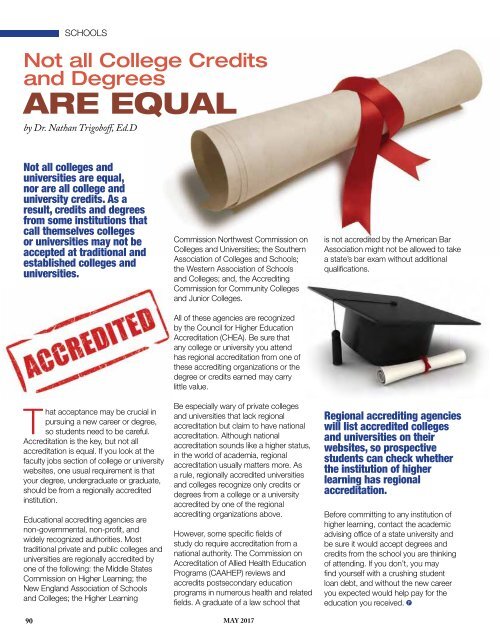May 2017
You also want an ePaper? Increase the reach of your titles
YUMPU automatically turns print PDFs into web optimized ePapers that Google loves.
SCHOOLS<br />
Not all College Credits<br />
and Degrees<br />
ARE EQUAL<br />
by Dr. Nathan Trigoboff, Ed.D<br />
Not all colleges and<br />
universities are equal,<br />
nor are all college and<br />
university credits. As a<br />
result, credits and degrees<br />
from some institutions that<br />
call themselves colleges<br />
or universities may not be<br />
accepted at traditional and<br />
established colleges and<br />
universities.<br />
That acceptance may be crucial in<br />
pursuing a new career or degree,<br />
so students need to be careful.<br />
Accreditation is the key, but not all<br />
accreditation is equal. If you look at the<br />
faculty jobs section of college or university<br />
websites, one usual requirement is that<br />
your degree, undergraduate or graduate,<br />
should be from a regionally accredited<br />
institution.<br />
Educational accrediting agencies are<br />
non-governmental, non-profit, and<br />
widely recognized authorities. Most<br />
traditional private and public colleges and<br />
universities are regionally accredited by<br />
one of the following: the Middle States<br />
Commission on Higher Learning; the<br />
New England Association of Schools<br />
and Colleges; the Higher Learning<br />
90<br />
Commission Northwest Commission on<br />
Colleges and Universities; the Southern<br />
Association of Colleges and Schools;<br />
the Western Association of Schools<br />
and Colleges; and, the Accrediting<br />
Commission for Community Colleges<br />
and Junior Colleges.<br />
All of these agencies are recognized<br />
by the Council for Higher Education<br />
Accreditation (CHEA). Be sure that<br />
any college or university you attend<br />
has regional accreditation from one of<br />
these accrediting organizations or the<br />
degree or credits earned may carry<br />
little value.<br />
Be especially wary of private colleges<br />
and universities that lack regional<br />
accreditation but claim to have national<br />
accreditation. Although national<br />
accreditation sounds like a higher status,<br />
in the world of academia, regional<br />
accreditation usually matters more. As<br />
a rule, regionally accredited universities<br />
and colleges recognize only credits or<br />
degrees from a college or a university<br />
accredited by one of the regional<br />
accrediting organizations above.<br />
However, some specific fields of<br />
study do require accreditation from a<br />
national authority. The Commission on<br />
Accreditation of Allied Health Education<br />
Programs (CAAHEP) reviews and<br />
accredits postsecondary education<br />
programs in numerous health and related<br />
fields. A graduate of a law school that<br />
MAY <strong>2017</strong><br />
is not accredited by the American Bar<br />
Association might not be allowed to take<br />
a state’s bar exam without additional<br />
qualifications.<br />
Regional accrediting agencies<br />
will list accredited colleges<br />
and universities on their<br />
websites, so prospective<br />
students can check whether<br />
the institution of higher<br />
learning has regional<br />
accreditation.<br />
Before committing to any institution of<br />
higher learning, contact the academic<br />
advising office of a state university and<br />
be sure it would accept degrees and<br />
credits from the school you are thinking<br />
of attending. If you don’t, you may<br />
find yourself with a crushing student<br />
loan debt, and without the new career<br />
you expected would help pay for the<br />
education you received. P

















